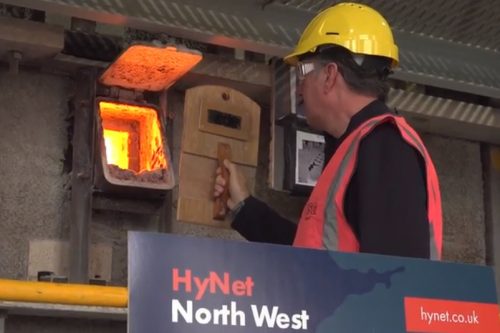Government backs green energy projects in North West – Nuclear HQ to be in region

The government is backing a number of North West green energy projects as part of plans to scale up affordable, clean, homegrown power and build green industries in Britain.
Also announced today (30 March), Great British Nuclear will officially be based in or around the Greater Manchester area. This will be a new organisation responsible with developing a new long-term funding model to develop new projects, with the aim that 25 per cent of the UK’s electricity will be from nuclear sources by 2050 – up from 15 per cent today.
The first job for Great British Nuclear will be launching a new competition to select the best Small Modular Reactor technology for development – smaller nuclear plants based on the latest technology – by Autumn.
In a further move away from importing expensive, foreign fossil fuels, the Government is delivering “a radical shift in our energy system” towards cleaner, affordable energy sources.
New green technologies, set to be developed and deployed here in the North West including carbon capture usage and storage (CCUS) and hydrogen, will spearhead the government’s new Energy Security Plan.
Today, four projects based in the North West of England were named by the Government, out of eight in total, to be taken forward to the next stage of negotiations to roll out the first carbon capture clusters in our industrial heartlands. These are: Viridor Runcorn Industrial CCS, Protos Energy Recovery Facility, Buxton Lime Net Zero and HyNet Hydrogen Production Plant 1 (HPP1).
The announcement follows the confirmation in the Spring Budget of £20 billion for projects to permanently store carbon emissions.
The government has also set an ambition for 10GW of hydrogen production by 2030 – which could generate enough clean electricity to power all of London for a year.
The North West will be central to these plans with three of the first successful applicants to the £240 million Net Zero Hydrogen Fund. Fifteen projects will be awarded grant funding of £37.9m to support the development and deployment of new low carbon hydrogen production plants. Hydrogen will play an important role in helping intensive industries such as chemicals, steel and cement convert to using clean energy.
The successful Net Zero Hydrogen Fund (NZHF) projects include Vertex, which is planning to build a new low carbon hydrogen production facility in Cheshire that will enable rapid decarbonisation of industry across the North West. The project is expected to complete a front-end engineering design study for its HPP2 project in 2023.
Vertex is progressing a second plant (HPP2) for 700MW into Front-End-Engineering-Design. This will be completed in 2023, positioning Vertex as the enabler of a broader hydrogen economy in the North West. The HPP2 plant has today received support from the Net Zero Hydrogen Fund as part of its development.
Joe Seifert, chief executive of Vertex Hydrogen, said: “The industrial revolution that led the development of the modern world, was founded and nurtured by the people and natural resources of the North West. Now the same region will lead this emerging low carbon hydrogen industry as a world leader in the race to NetZero. The news is great for the environment and great for the regional economy.”
Progressive Energy: aiming to develop new low-carbon hydrogen production plants. In this world-first example, green hydrogen will be used to help decarbonise the glass production industry.
Progressive Energy: their TATA Chemicals Green Hydrogen project plans to produce a Front-end Engineering and Design (FEED) study to support the development of hydrogen production plants at Winnington and Middlewich.
The government are also investing a further £55m in the North West region to support charging infrastructure for the transition to electric vehicles.
Prime Minister Rishi Sunak said: “Thanks to our unique geography and strong expertise in clean technology, the UK is well placed to create thriving new industries in carbon capture, hydrogen and floating offshore wind across the country.
“By investing in new ways to power Britain from Britain, we will not only strengthen our long-term energy security, but also deliver on our promise to grow the economy with well-paid jobs and opportunities for businesses to export their expertise around the world.”
Energy Security and Net Zero Minister Graham Stuart said: “The North West will be at the heart of our plans to power up Britain, as we support its development of new home-grown technologies of the future.
“Today’s announcement will create opportunities for North West of England businesses to export their expertise around the world and set the standard for a clean, secure and prosperous future.”
As the government continues to support hydrogen innovation, it also named the University of Manchester as one five winners that will share of £19.4 million from the Low Carbon Hydrogen Supply 2 competition. The funding will support their project to reduce costs and increase the efficiency of hydrogen production.
Alongside this, four companies based in the North West have been shortlisted to proceed to the next stage of the first electrolytic hydrogen Allocation round (HAR1) to kick start the low carbon hydrogen economy across the UK and help meet the country’s wider net zero target.
These are: Barrow Green Hydrogen, Cheshire Green Hydrogen, Quill 2 and Trafford Green Hydrogen.




